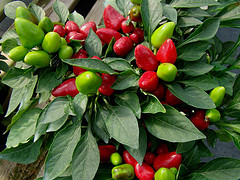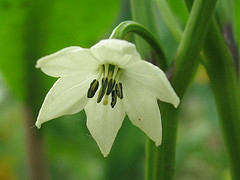Where Can the Hot Pepper be Found?
Hot peppers are an annual plant, which
means they usually live for about a year. They will germinate,
flower, and then die in a year. Hot peppers are also a native of
tropical areas, where they can thrive in extremely dry soil. They
can also be grown around the world if the conditions are right.
This is a very common occurrence because hot peppers have a very
unique taste. Click
here to see a map of where
Capsicum is found around the world!
The hot pepper is a warm season fruit with a relatively long growing period to maximize the amount of peppers produced. Peppers can survive in a wide range of temperatures and rainfall amounts. They are usually a rain fed crop, but can also be grown under irrigation. However, water logging for even a short period of time may cause the plant to shed its leaves. Also, high humidity may encourage the growth of detrimental fungi.
Sometimes
the lack of flowers and fruits can be a problem when trying to
grow hot peppers. Considering the hot pepper is the fruit, if you
can't grow the pepper, that would be a considerable problem. Occasionally though, hot pepper plants won't produce
flowers. This happens most often in short summer climates like the
northern half of America. Experts think that wilder varieties
of hot peppers need the colder weather of early fall to produce
fruit. Flowering may be triggered as the days get shorter in
September.
If you're interested in growing hot peppers, this is for you! To make a hot pepper even hotter, water and fertilize as little as possible. On the other hand, if you would rather have milder peppers, keep the plants well watered and provide afternoon shade in hot climates. Also, when the plant starts producing flower buds, the recommended procedure is to cut them off. This forces the plant to put forth more energy into making the pepper instead of trying to make the pepper and the flower.
If you're interested in finding out what kind of adaptations the hot pepper had to go through to survive in this type of habitat, click here to go to the Adaptations page!
